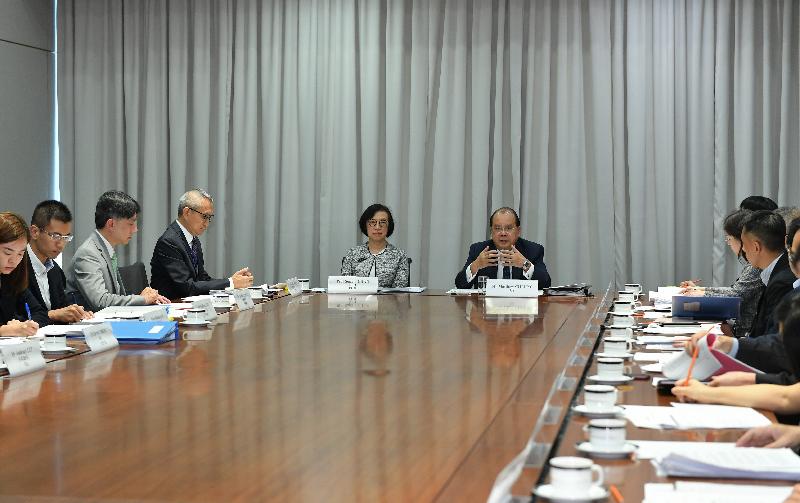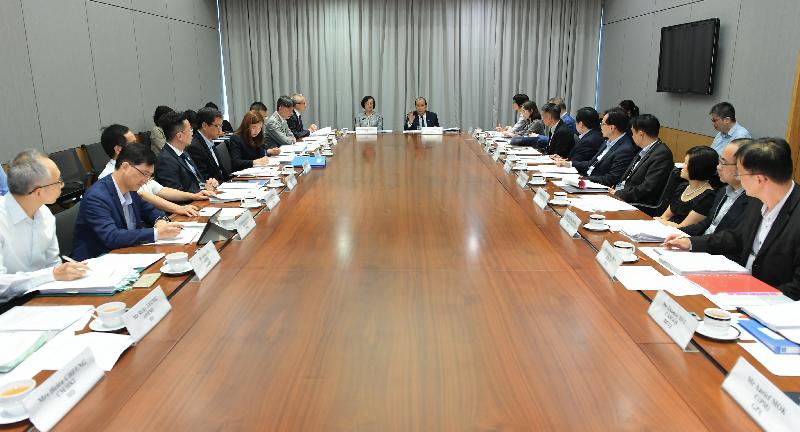Government reviews territory-wide cleansing and anti-rodent work (with photos)
The interdepartmental Pest Control Steering Committee met today (June 20) to review the enhanced anti-rodent work carried out by various government departments since the cleaning campaign over the territory commenced on May 20 and set priorities for the work ahead.
The Government has provided an additional funding of $91 million this financial year to various departments for enhancing pest control work. During today's meeting, various departments discussed the extra resources required for the relevant work. The Government had earlier expressed that full support would be given to department’s pest prevention and control work.
Various departments briefed the meeting on the progress of territory-wide cleaning work in all 18 districts. They include:
– District Offices (DO) of the Home Affairs Department (HAD) have assisted different departments on reporting the cleaning and anti-rodent work carried out in each district as well as the liaison with stakeholders in the community to raise public awareness of rodent prevention and control.
– Among the some 180 public rental housing estates in the territory, the Housing Authority (HA) has examined the rodent-proofing structure installed in 133 estates. The HA will repair and arrange the reinforcement of the existing structure as well as install additional structure immediately if needed with a view to eliminating activities of rodents and their harbourage points. The HA has also enhanced the cleaning work in all public rental housing estates and strengthened enforcement action under the Marking Scheme.
– The Highways Department has filled rat holes at 80 back alleys, and repaired damaged road surface or surface channels at 45 back alleys. Relevant works will be continued to be conducted at other back alleys.
– The Food and Environmental Hygiene Department (FEHD) has enhanced cleaning in all public markets, particularly the drains, to eliminate food sources of rodents. During the first four weeks of territory-wide cleaning campaign, the FEHD collected 2 137 dead rodents, caught 1 560 live rodents as well as filled 956 rat holes.
– Regarding illegal disposal of refuse at rear lanes by food premises, the FEHD issued 72 summons, 103 Fixed Penalty Notices, 1 900 advisory letters, 324 verbal warnings and a nuisance notice during the first three weeks (from May 27 to June 16) of the special operation.
In terms of the focus of the work ahead, the Buildings Department and the Architectural Services Department have drawn up practice notes for building professionals' reference on incorporating rodent proofing design in new buildings to achieve rodent prevention and control in the long run. On the other hand, the HA has been actively examining the rodent proofing structure installed in over 180 public rental housing estates across the territory. The FEHD has been offering technical support including compiling a checklist of rodent proofing structure for the Housing Department to follow up. The FEHD will carry out an intensive anti-rodent operation in three public markets in early July. Specific measures include speedy clearing of refuse and cleaning all drainages in the markets after the stalls are closed every night to eliminate food sources for rodents and placing traps extensively to strengthen rodent disinfestation. All DOs of the HAD will continue to assist coordination among various departments on cleaning and anti-rodent work as well as cooperation and communication with the District Councils in order to raise public awareness on hygiene and rodent control.
The FEHD has also stepped up publicity work on rodent prevention and control through various channels to spread the messages of active public participation in anti-rodent operation.
According to the World Health Organization, several Asian countries are experiencing unusually high numbers of dengue fever (DF) cases for this time of year. The latest figures revealed that 77 040 cases had been recorded in the Philippines (which was almost double the number of cases reported in the same period in 2018), 52 941 in Malaysia (which was around twice the number of cases reported in the same period in 2018) and 59 959 in Vietnam (which was more than triple the number of cases reported in the same period in 2018). According to the announcement of the Health Commission of Guangdong Province, the epidemic season of DF started early this year in Guangdong. As of June 12, 240 cases have been recorded in Guangdong this year, which was significantly higher than that in the same period last year (44 cases). In Taiwan, 21 local cases have also been recorded in 2019. With the approaching peak tourist season in summer, members of the public who intend to travel aboard should stay alert and take appropriate personal protective measures.
Scientific studies have shown that infected persons can transmit the virus to mosquitoes through mosquito bites even if they remain asymptomatic or before their onset of symptoms, leading to further spread of the disease. Hence, to reduce the risk of local infections of mosquito-borne diseases, travelers who return from affected areas should apply insect repellent for 14 days or at least 21 days after arrival in Hong Kong to prevent mosquito bite. If feeling unwell, they should seek medical advice promptly, and provide travel details to their doctors.
The more humid weather with higher temperature this year facilitates mosquito breeding. At today's meeting, various departments also discussed corresponding follow-up work and would enhance anti-mosquito measures at infestation blackspots under their purview. Since this month, the FEHD has conducted a trial of placing ovitraps with improved design in Wong Tai Sin, Yau Tong and on Cheung Chau to calculate the density of adult mosquitoes. The quantitative data would be the basis for planning mosquito prevention work.
The Under Secretary for Food and Health, Dr Chui Tak-yi, chaired today's meeting and representatives from three bureaux and 22 departments/organisations attended. The Chief Secretary for Administration, Mr Matthew Cheung Kin-chung, and the Secretary for Food and Health, Professor Sophia Chan, also attended the meeting.

